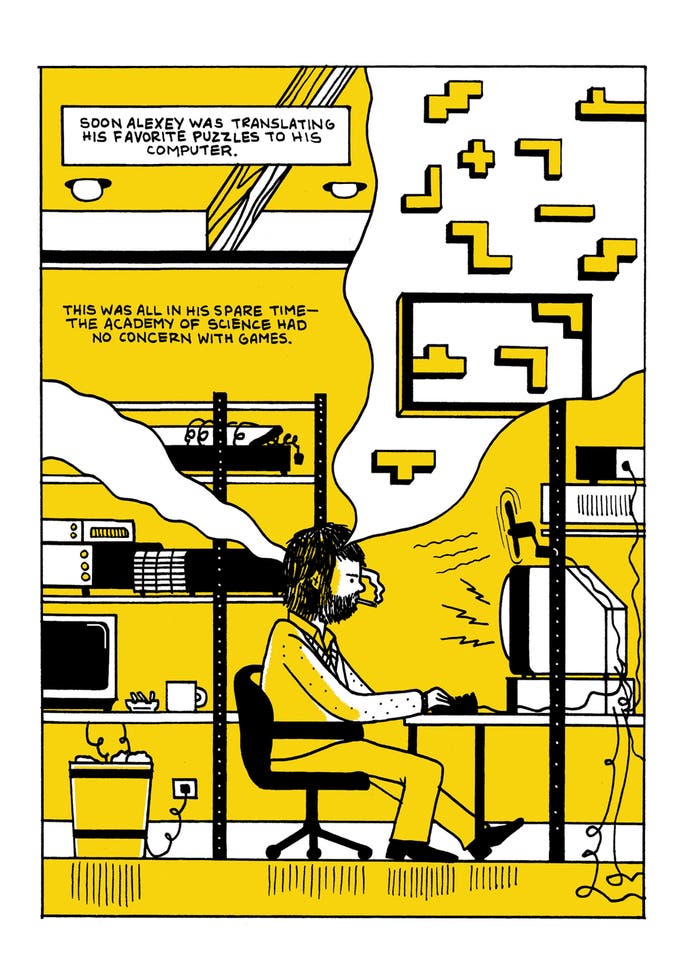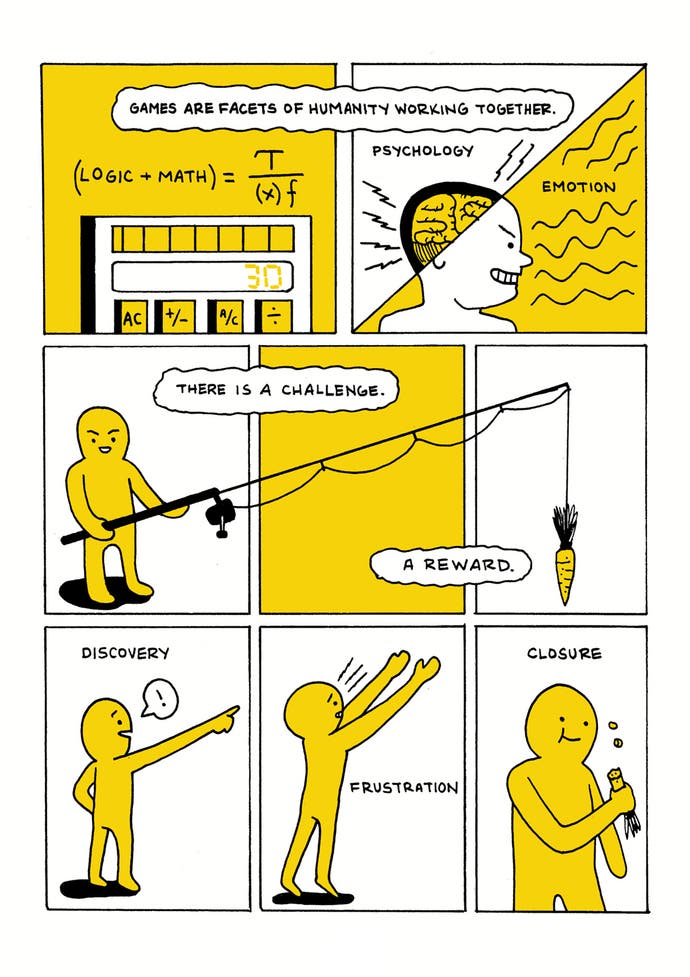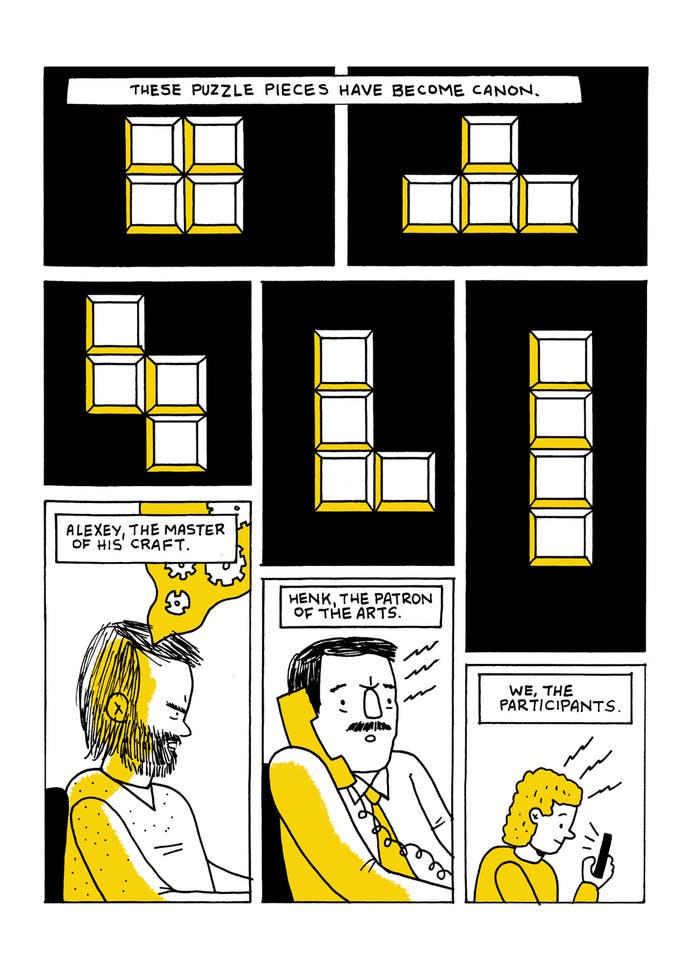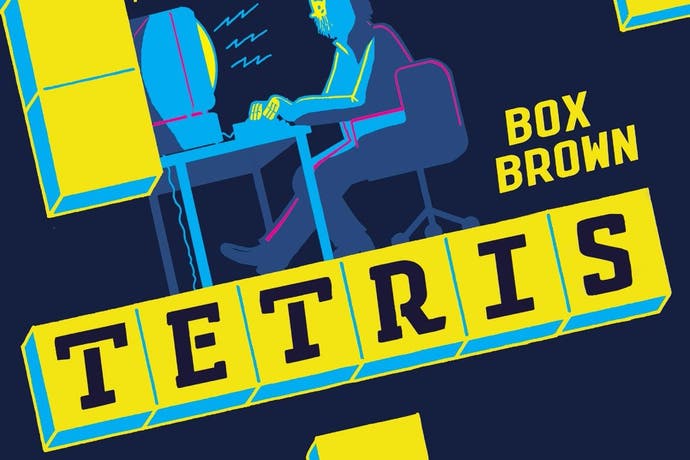Block ops: How everything fell into place for Tetris
Writer/artist Box Brown on his ambitious new graphic novel.
Tetris is a game with no story. The closest you get to a plot twist is rotating your current shape - officially, a tetromino - in the hope of a closer fit with the ad-hoc crenellation below. Achieve your nominal quest by creating a complete line and the result is not closure, it's erasure. The only real narrative comes with failure: a screen now cluttered with poorly stacked pieces standing as an autobiographical document of your own shortcomings as a player.
But look past the skydiving blocks, the gaping existential well and the endless Korobeiniki folksong rendered in chirpy chiptune and there is a staggering true story behind Tetris. A game invented by mild-mannered computer engineer Alexey Pajitnov in 1984 at the heart of communist Russia, the perennial puzzler would smash through - or at least sneak under - the Iron Curtain and proceed to conquer the entire world in an astonishing act of soft power.
How this transpired is a labyrinthine tale that combines high art, low cunning and an awful lot of international contractual wrangling conducted by fax. For Box Brown, a US-based writer and artist, the semi-secret history of Tetris became a slow-burning obsession. So when it came to following up his 2014 graphic biography of wrestling legend Andre The Giant in 2014, Brown decided to grapple with another icon that has loomed large in pop culture. The result is Tetris: The Games People Play, published last week.

"When I started on this project, I thought: maybe I'm not really qualified to talk about Tetris," says Brown, down the line from the Philadelphia studio where he also runs his own small press imprint RetroFit Comics. "But then I realised I'd definitely put 10,000 hours into it. I think pretty much everybody has. I had a Game Boy when it first came out so I played Tetris pretty regularly from 1989 pretty much up until 1996. And my dad would play it, my nana would play it ... it was just this game that crossed so many of the usual barriers."
Brown's 260-page graphic novel begins with Pajitnov - the daydreamer who invented Tetris when he wasn't working on voice recognition software for the Russian government - batting ideas around with his friend and colleague Vladimir Pokhilko. It soon grows to encompass a cast list of interested parties that won't stop expanding: Russian bureaucrats, video game execs from Nintendo, Atari and Tengen, bellicose tycoon Robert Maxwell plus an army of lawyers, negotiators and the occasional iconic head of state, all rendered in Brown's clean but evocative style.
"One of the first things I did was draw out this big family tree of all the characters and how they were connected with each other so I could keep it straight," says Brown. "But I think of Alexey as the protagonist of the book, even though there are all these other people involved, because I identify with him: he's the creator, he's the artist. Everyone else comes from the business side, they smell the money. But if we're going to live in a capitalist society, you sort of need both of those things, and sometimes I think artists find it hard to understand that."
A documentary addict, Brown was originally alerted to the cloak-and-dagger hinterland of his favourite game by the 2004 BBC film Tetris: From Russia With Love. He subsequently sought out David Sheff's excellent 1993 non-fiction book Game Over: How Nintendo Conquered The World. "Almost any other book that references Tetris, they all come back to Game Over," he says. While he has yet to meet his hero Pajitnov, Brown did speak to other primary sources, like Gilman Louie, the executive for Spectrum Holobyte who introduced Tetris to the US market.

"Louie was able to give me some real insight into the various negotiations with the Russian government that took place," says Brown. "He also explained how the US video game market initially wasn't sure about Tetris. They wanted games aimed at men: violent games, games where the quality of the graphics was a big part of it. They just weren't sure how they were going to sell this abstract concept. It's so funny because it really doesn't need anything, the game sells itself. But they ended up using a big marketing campaign about it being this scary thing that came out of communist Russia."
After being an enormous home computer hit, Tetris went supernova with the release of Nintendo's Game Boy in 1989, becoming emblematic of the Cold War just as it was about to reach a brittle breaking point. Against a tense geopolitical backdrop, Brown's reconstruction of the Tetris story unfolds like an international chase thriller, a forensic paper trail, a knockabout farce, a tense US courtroom drama, even a horrifying personal tragedy. But Brown goes beyond even that, using Tetris as a prism to interrogate wider, more philosophical questions about how games relate to humanity, zooming back to cave paintings and the early Egyptian boardgame Senet (and if you want to know more about Senet, boy, have we got you covered).
"I saw this as a book about Tetris but also a window into discussing: what's the deal with games in general?" he says. "My Andre The Giant book was similar: what's the deal with pro wrestling? I think of these things the same way: as an art form that is barely considered an art. Comics, sure, we are just about ready to accept that as an art form. But I think pro wrestling, most people would take a lot of convincing. And video games are the same way. Whereas I see the creation of games as nothing but art."
Toward the end of the book, there is a gutpunch revelation involving Pajitnov's lifelong friend Pokhilko that, if you are unfamiliar with the story, seems to come from nowhere. How did Brown approach including a tragic murder/suicide? "I did debate it for a while but I couldn't not put it in," he says. "It was so sad and horrible but it also speaks to one of the themes of the book. I think of it as almost a Kurt Cobain situation, where you get this big piece of fame sent your way but it's not really the job of a creative person to deal with it. There are these tragedies that can happen when make a piece of art and it gets sucked up by capitalism."

A lifelong gamer, Brown is an enormous Legend of Zelda fan. "I've bought at least two or three consoles just to play a Zelda game," he says. "I'll pull one out from the stack every six months and play it all the way through." He also admires the cartoonish art style and explosion-obscured strategic elements of evergreen shoot-em-up franchise Metal Slug. But there's a game - or series of games - he might be more addicted to than even his beloved Tetris.
"I'm obsessed with Kairosoft, the Japanese company behind Game Dev Story. That was such a huge hit that they've released about 40 other management simulators and I think I've played them all." Is there one that simulates the life of an independent comics writer/artist? "No, but there's a manga studio one! I love these games so much... at one point I designed some fake screenshots for a pro wrestling management version. I was really trying to design it as a game, and actually sent through my ideas to Kairosoft. But so far they haven't got back to me."
His career as a games developer may be yet to blossom but Brown will spend the next few months on the road to promote the new book, even coming to the UK in November. Though his vivid account brings the Tetris story right up to 2015, the saga is still ongoing. The latest plot twist is the widely reported news that Tetris is being adapted, Battleship-style, into a movie property so epic it will require a trilogy.
Having spent so long immersed in the game and its mythology, does Brown have any advice for the screenwriters presumably casting round rather frantically for a plot to hang on the falling blocks? "That's the movie where the pieces are going to be aliens or something like that, right?" he says. "I don't really know, man. I mean, I'd be happy for Tetris if a big movie helped them sell more games. But I know that Alexey Pajitnov has already sold his life rights for someone to make into a movie and, to be honest, that would be much more interesting to me."
Tetris: The Games People Play is published October 11 by SelfMadeHero. A free UK launch night will take place at gaming bar Scenario in Stoke Newington, London on November 3. For more info, visit www.boxbrown.com

